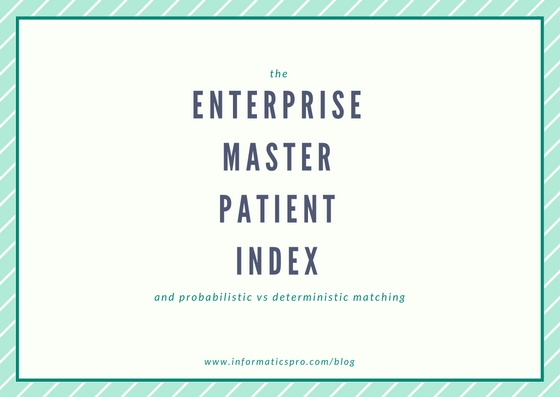In this week’s question of the week post, we’re going to briefly summarize enterprise master patient indexes. eMPIs are an alternative to using ID sets (an identifier consisting of multiple types of personal information to identify a patient) or a personal identifier (a number assigned to a patient by a health care organization) to identify a patient in a health care setting.
The enterprise Master Patient Index (eMPI or MPI) is a database that creates a unique identifier for each patient which can then be used to identify each patient across an organization’s information systems. An eMPI allows administrators to update identifying information for a patient in only one system. This helps remove inconsistencies that commonly occur in multiple systems when a patient’s information changes.
eMPIs use a match system that matches a patient to various identifying elements (such as address, DOB, name, etc.) to find out if the patient is in the system or not and, if so, accesses the correct record. This match system should be able to compensate for possible differences between elements, such as spellings, typos, formatting, transpositions, and more. Various matching algorithms exist to perform this matches, including deterministic and probabilistic matching algorithms.
Deterministic matching looks for an exact match of data elements—which is fine if all the data between your systems looks the same. However, we know that that is not often the case, so deterministic matching does not have the accuracy most healthcare organizations would need when identifying individual patients.
Probabilistic matching looks for and ranks relevant matches based on data inputs. It is a much more complicated algorithm than deterministic matching and can search for relevancy based on the frequency of a word, the distance between words, or other search techniques. It can also better support transpositions, phonetic searches, and alternate name cross referencing. Some probabilistic algorithms can alert the user of possible duplicates and categorize the results as matches, non-matches, or potential matches.
Practice Question:
Your hospital has recently been having trouble properly identifying patients who have in the past gone through a name change. As a result, the hospital is looking for the most accurate way to identify patients and alert administrators to possible duplicates of the same patient with different names in their system. Which patient identification method would work best for this hospital?
A.) ID Set
B.) eMPI with deterministic matching
C.) Patient Identifier Number
D.) eMPI with probabilistic matching
Answer:
If we’re looking for an accurate way to identify patients, then eMPI using a probabilistic matching algorithm is the way to go. It is the most accurate since it results in the creation of fewer duplicate records, can find likely matches, and alert the user to possible or questionable matches. So, D is the correct answer.
We hope you found this article and question useful. If so, be sure to check out our other resources including our book, which contains over 280 of these practice questions.

